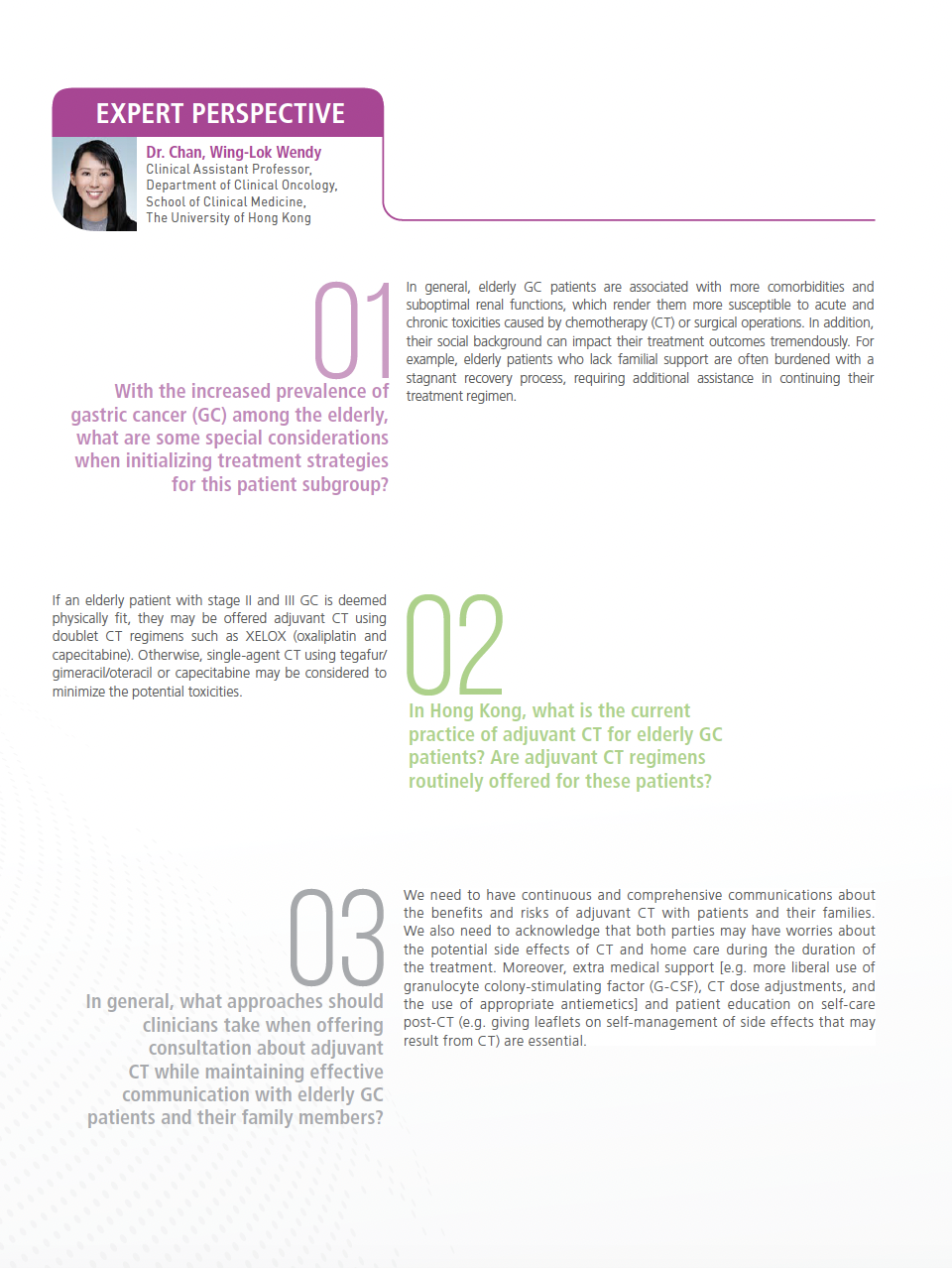NEWS & PERSPECTIVE
Adjuvant chemotherapy within 6 months post-operation leads to desirable survival outcomes for elderly GC patients in Hong Kong
Adjuvant chemotherapies (CT) are conventionally offered to patients with gastric cancer (GC) who underwent gastrectomy to reduce the risk of disease recurrence.1 Nevertheless, their benefits for elderly GC patients remained uncertain.1,2 Results from a retrospective population-based cohort study from the Department of Clinical Oncology, School of Clinical Medicine, LKS Faculty of Medicine, the University of Hong Kong (HKUMed), indicated that the introduction of adjuvant chemotherapies to elderly patients with stage II/III GC after undergoing gastrectomy with D2-dissection induced significant improvements in survival outcomes.1
Disease recurrence has been a major issue for GC patients post-operation.1 A retrospective analysis based on the Chinese population concluded a 60.8% recurrence rate for GC patients after gastrectomy, with 42.5% of patients experiencing recurrence within 2 years after operation.3 The effectiveness of adjuvant CTs in reducing the risk of relapse and improving survival outcomes for general GC patients is debatable, particularly in the elderly (age ≥65 years) subgroup.1 A Korean 4-year prospective study published in 2015 determined that adjuvant CT contributed a significant improvement in relapse-free survival (RFS) (HR=0.50; 95% CI: 0.27-0.96; p=0.03) for stage II/III GC patients after gastrectomy with D2 dissection, though no significant improvement in overall survival (OS) (p=0.24) was recorded.2 To evaluate the efficacy of adjuvant chemotherapy in elderly patients with stage II/III GC after gastrectomy with D2 dissection, a retrospective, multicentre study based on Hong Kong’s GC patient population was initiated1
A total of 1,464 patients aged ≥65 years who underwent gastrectomy with D2 dissection for stage II/III GC were enrolled in this study, in which 11.8% of patients were aged >80 years.1 The study population was further divided into two cohorts, both consisting of 732 patients.1 The adjuvant CT cohort included patients who received chemotherapy (5-fluorouracil, S-1, capecitabine, oxaliplatin, cisplatin, docetaxel or epirubicin) within 6 months after gastrectomy with D2 dissection.1 While the surgery-alone cohort included patients who underwent a gastrectomy without receiving any adjuvant chemotherapy.1 The primary endpoints of this study focused on the survival outcome of the two cohorts, which consisted of OS and cancer-specific survival (CSS).1 Additionally, the incidence of severe adverse events (SAEs) in the adjuvant CT cohort served as the secondary endpoint of this study.1
The results of the study demonstrated that adjuvant chemotherapy was associated with favorable survival benefits compared to the surgery-alone cohort, significant OS improvements were observed, with an overall 20% mortality risk reduction for the adjuvant CT cohort (median OS: 37 vs. 25 months; HR=0.80; 95% CI: 0.75-0.84; p<0.001).1 These OS improvements were significantly presented in the two age subgroups of patients, with an 18% reduction in mortality risk for patients aged >80 (HR=0.82; 95% CI: 0.71-0.96; p<0.001) and a 21% reduction for patients aged 65-80 (HR=0.79; 95% CI: 0.74-0.84; p<0.001).1 The positive association between adjuvant chemotherapy and OS improvement was consistent across various patient subgroups, regardless of gender, history of diabetes, serum albumin level and estimated glomerular filtration rate (eGFR) level.1
The adjuvant CT cohort showed a significant improvement in CSS when compared to the surgery cohort.1 There was a 15% risk reduction in GC-related death, with a 5-year CSS of 64.1% in the adjuvant CT cohort vs. 61.1% in the surgery cohort (HR=0.85; 95% CI: 0.79-0.93; p<0.001).1 This improvement was also significant in the subgroup aged 65-80 (HR=0.91; 95% CI: 0.84-0.99; p=0.03) and those aged >80 (HR=0.52, 95% CI: 0.41-0.65, p<0.001).1
Throughout the study, the adjuvant CT cohort had an early treatment termination rate of 19.1%, including 18.6% of patients aged 65-80 and 23.5% of patients aged >80.1 Grade 3/4 anemia remained the most prevalent SAE for the adjuvant CT cohort (30.9%).1 Incidence of neutropenia (12.8%), thrombocytopenia (8.6%), febrile neutropenia (7.4%), pneumonia (7.5%) and urinary tract infection (UTI) (2.3%) were recorded as well.1
In summary, the inclusion of adjuvant chemotherapy contributed to significant amelioration in survival outcomes for elderly patients with stage II/III GC after gastrectomy with D2 dissection.1 Further prospective studies may be required to qualify the treatment outcomes of such personalized treatment for the elderly population.1


